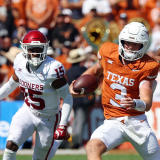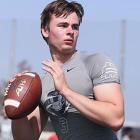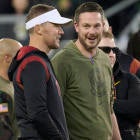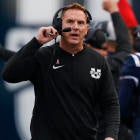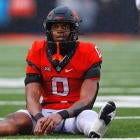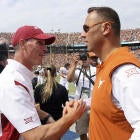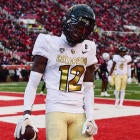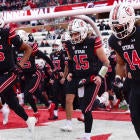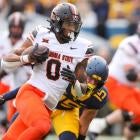If you're wondering which college football newcomers will be impact player this season, you can usually find them on campus by spring practice. That's when early enrollees and transfers get acclimated to new environments, coaching staffs and playbooks. For freshmen or transfers that arrive in the summer, it's typically too much to ask for them to be ready just a few short months later.
These are the exceptions.
Right about now, newcomers around college football are arriving for summer sessions and their first exposure to their new teams. Excluding graduate transfers, these are the summer arrivals that will be ready for major impacts if not starting roles by Week 1.
J.T. Daniels, QB, USC: Expectations are quickly rising for Daniels, a true freshman who skipped his entire senior season to enroll at USC. Those expectations were heightened by a spring practice that didn't showcase a competent successor to Sam Darnold at quarterback. Daniels threw for over 12,000 yards in three seasons as a starter in high school, and you don't skip your senior year unless you see an immediate opportunity to play. The opportunity is there and Daniels is good enough to take advantage.
Pat Surtain Jr., CB, Alabama: Surtain is as equipped to start as a true freshman as anyone in the country. He's the son of a former All-Pro cornerback. He's got size, speed and polish. In fact, Surtain was nearly assured a starting job at LSU, his long-time leader during his recruitment, before Alabama landed him. Instead, he walks into a national championship ready team with secondary as its only glaring hole. Surtain is good enough to fill that hole, even with a summer arrival.
Justin Shorter, WR, Penn State: There's plenty of talent returning at wide receiver for Penn State, so this isn't a product of an incomer filling a hole. Shorter is just too good to keep off the field. He's the rare big receiver (6-foot-4, 220 pounds) who has legitimate speed (he's a verified 4.5 40 guy) and the polish to get snaps immediately. New offensive coordinator Ricky Rahne and his Heisman Trophy candidate QB Trace McSorley like taking downfield shots, and Shorter is a perfect downfield option.
Emmit Gooden, DL, Tennessee: New coach Jeremy Pruitt is trying to quickly turn Tennessee into a bigger, more physical football team. Gooden arrives from the junior college ranks as a 6-foot-4, 305-pound hunk of mass that can be help drive that transition. Jonathan Kongbo has already indicated that he's making the move to outside linebacker which further opens up some opportunity and a need on the defensive interior for Gooden.
A Virginia Tech cornerback: Justin Fuente was supposed to have a bulletproof succession plan to replace his two senior starters at cornerback ... until then Adonis Alexander left the team due to academic reasons and junior college transfer Jeremy Webb suffered a season-ending achilles injury. Now a freshman will need to step up. There are plenty of options coming in this summer, but Nadir Thompson may be the most ready-made to contribute quickly. Chamarri Conner is an option if he moves down from safety to cornerback. And then there's DeJuan Ellis, a dynamic playmaker that will get a shot at quarterback but could be an NFL cornerback or receiver.
Tyson Campbell, CB, Georgia: Campbell, a high school teammate of Surtain, is the No. 2-ranked cornerback in the country (per the 247Sports Composite), and he has the same elite size, speed, athleticism traits of Surtain. At Georgia, he walks into a secondary with one entrenched cornerback starter in Deandre Baker. The other side of the defense is up for grabs to the best man. At 6-foot-2 with 10.3-second speed in the 100 meters, Campbell may just be the best man, even as a summer arrival.
Tre'Shaun Harrison, WR, Florida State: During a trying year for Florida State in 2017, one of the biggest issues on offense was the inability to find big plays from its wide receivers. Aside from Nyqwan Murray, there isn't a lot of reason to believe that the same unit is more equipped to turn that around. Enter Harrison, one of the biggest gets of Willie Taggart's first Florida State recruiting class. Harrison is a burner out of Washington that averaged 20 yards per catch in high school and can add immediate explosiveness to the perimeter.
Brevin Jordan, TE, Miami: All of those quarterbacks competing for a starting job at Miami will be pleased with what they see out of Jordan in team workouts and 7-on-7s this summer. By the middle of the season, don't be surprised if the Bishop Gorman product is a favorite target for whoever wins that job. Jordan is an elite pass-catcher that creates matchup problems for defenses and all he has to do is edge out Michael Irvin II to get a starter's workload. I'm betting that happens in Year 1.
Miles Jones, WR, Nebraska: Scott Frost's offense is built to give space players the opportunity to go make plays. He's inherited a couple of good ones in JD Spielman and Tyjon Lindsey, but Florida native Miles Jones is good enough to join the stable in Year 1. He was a do-everything player for one of the top teams in Florida and fits Frost's system with the ability to catch and run. He also averaged 30 yards per kick return and 16 yards per punt return in high school and scored as a runner, receiver and returner.
Dorian Thompson-Robinson, QB, UCLA: With a run-down quarterback room that only has a one-semester head-start on in Chip Kelly's offense, Thompson-Robinson will have the opportunity to win the job in year one. Thompson-Robinson only has one year of starting experience in high school, but he's the type of talent that makes UCLA exponentially more dangerous if he can win the job right away. With a bad offensive line, that may be a lot to ask of a freshman. But Thompson-Robinson also provides some athleticism that could mask some struggles up front. Even if he doesn't win the job in year one, this is the quarterback of the future for Kelly.


